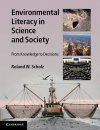"[...] Environmental Literacy in Science and Society provides a potential basis for research and conceptual revisions in coming decades."
- Harald A. Mieg, Science
"[...] [Scholz's] magnum opus is both an advanced textbook and an inspirational source of insights and knowledge concerning environmental issues. It also provides a thorough framework for decision making aimed at bringing about sustainable solutions to environmental problems. It is a lasting hallmark of environmental literacy."
- Ton Schoot Uiterkamp, Journal of Integrative Environmental Sciences
"With his book, Roland W. Scholz is likely to have initiated a strand of literature dealing with how mankind can become more literate with regard to solving environmental problems and creating sustainable development through multi-perspective approaches of transdisciplinarity."
- Stefan Schaltegger, Ecological Economics
"[...] lucid and inspiring [...] a treasury of information and a very useful heuristic tool."
- Environmental Science and Policy
"[...] a valuable, intelligible and well structured teaching resource for university courses in a broad array of studies, including environmental and sustainability sciences, ecology, planning, engineering, management and environmentally oriented branches of sociology, economics, psychology, behavioural biology and similar fields. The book is suitable, too, for enhancing the environmental literacy of non-professional readers who are politically and environmentally engaged, intellectually capable and open-minded; who have an interest in sustainability science; and who are interested in the theory, history and philosophy of natural, environmental and behavioural sciences."
- Ralph Hansmann, Sustainability
"Environmental Literacy [in Science and Society] provides a blueprint for transformative science and shows on what high level [...] today's research may be performed."
- Uwe Schneidewind and O. Smekar, translated from Gaia
"Roland Scholz has written a visionary book that for the first time comprehensively approaches modern sustainability challenges by recognizing the critical role of integrated human, natural, and built domains in the complex systems that characterize the Anthropocene. It is an important step forward in our ability to understand, and respond ethically and rationally to the demands of environment, technology, and society in a context of complexity that is increasingly beyond traditional disciplinary and policy approaches for linking theory and practice."
- Braden Allenby, Lincoln Professor of Engineering and Ethics, Arizona State University
"In this brilliant work [...] Scholz addresses how society may make the 'great transition' toward sustainability in a remarkably open and honest exploration of human-environment systems. [He] argues that we need new knowledge and new science to tackle these challenges: the 'environment' must be redefined as a co-evolving system coupled to human systems. Furthermore, he demonstrates that interdisciplinary research is not enough – we need transdisciplinary research to integrate our scientific knowledge in a way that results in sustainable decision making. The book is critically important in providing a roadmap to begin the transition to a sustainable world; the reader experiences an unforgettable journey toward ecological literacy, achieving a sufficient understanding of human-environment interactions to manage the Earth's biogeochemical cycling in a sustainable way [...] a must-read for anyone who relies on planetary resources and ecosystem services.
- Cliff Davidson, Thomas C. and Colleen L. Wilmot Professor of Engineering, Syracuse University
"Developing adequate solutions for human-environmental problems requires both substantive expertise and a deeply interdisciplinary perspective. Anyone who doubts this assertion need spend but a few minutes reading almost any part of Roland W. Scholz's monumental work on environmental literacy to have their doubts erased. In addition to thoughtful theoretical discussion they will find case after case of detailed worked-out examples that illustrate both the complexity, and the exciting intellectual challenges, that face students and professionals working to create a better and more sustainable world."
- M. Granger Morgan, Lord Chair Professor in Engineering, Carnegie Mellon University
"Collective environmental and social problems constitute the dark side of increasing wealth for growing human populations. Roland Scholz strongly pleads for broad, multi- and interdisciplinary thinking about human-environment interactions. In [his] view, human and environmental systems cannot be separated. Rather, their interaction should be the central topic of our visions, methodologies and strategies. For natural scientists and technologists this requires a basic familiarity with how human individuals and societies function. For behavioral and social scientists it demands a solid appreciation of specific environmental problem domains. By consequence, actual policy-making should rest upon integrative teamwork. Scholz's book provides for an inspiring boost to our own environmental literacy, what it is and how it historically developed. It's a fruitful basis for extensive student courses."
- Charles Vlek, Professor of Environmental Psychology and Decision Research, University of Groningen




































